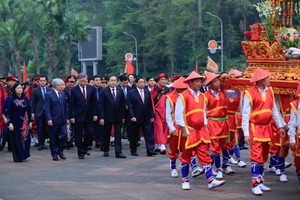Although the two wars of independence finished over 30 years ago, many still remember a group called “Hoang Mai Luu” set up by Huynh Van Tieng, Mai Van Bo and Luu Huu Phuoc in 1943. The group successfully attracted patriotic artistes who made great contributions to revolutionary campaigns against French domination and the US invasion.

Tieng, Bo and Phuoc were students, leaving their hometown in the South for the Hanoi to study, but they decided to join the war of resistance instead.
In 1945, the three students rode from Hanoi to Saigon to prepare for the general uprising on August 25.
Tieng worked for the Saigon-Cho Lon Uprising Committee and was elected member of National Assembly. At the session on January 1946, Tieng proposed the National Assembly to change the name of Saigon to Ho Chi Minh City.
After liberation in 1975, Saigon was officially changed to HCM City in accordance with Tieng’s proposal some thirty years previously.
In May 1946, Tieng accompanied the delegation of the National Assembly, led by Pham Van Dong and Ton Duc Thang, to France to state Vietnam’ s case for the country’s unification and request the French to respect its independence.
After returning to Saigon, Tieng joined the Southern Uprising Committee and took charge of propaganda duties. Tieng established the radio station Voice of the South.
Like the Voice of Dong Thap Muoi and the Voice of Southern Resistance, the main task of the Voice of the South was to encourage people in the South to fight against the French.
In 1954, Tieng was ordered to go the Hanoi again, where he was appointed deputy editor-in- chief of the Voice of Vietnam.
In late 1954, the National Front for the Liberation of South Vietnam was established, and the Hoang Mai Luu Group composed the song Giai Phong Mien Nam (Let’s go liberate the South!), which was composed under the pseudonym Huynh Minh Sieng, to mark the event.
The song was later widely sung by revolutionary troupes and regularly broadcast on the National Front for the Liberation of South Vietnam’s radio station.
After the collapse of Saigon in 1975, the song was adopted by the Provisional Revolutionary Government (PRG) as the national anthem of the South (The PRG and North Vietnam were merged to form the Socialist Republic of Vietnam on July 2, 1976).
After the Mau Than uprising in 1968, Tieng was requested to outline plans for the establishment of Vietnam TV, which was founded on May September 1970 at 58 Quan Su Street in Hanoi.
On 28 April 1975, the war of resistance was coming to an end. As deputy director the Voice of Vietnam and head of Vietnam TV at the time, Tieng was ordered to go to the South to prepare for the taking over of Saigon radio and TV stations.
Tieng, together with a team of staff, took an express train departing for Saigon. In the afternoon of April 30, right after Saigon was liberated, the delegation was present at Sai Gon TV, ready for the takeover.
Tieng immediately worked with Commander Le Vinh Hoa, general director of the General Directorate of Saigon government’s Radio, Television and Cinema to organize the PRG’s first TV broadcast on the night of May 1. It has continued broadcasting ever since.
Tieng was appointed to the post of director of the PRG’s TV Station (now HCM City TV) until he retired in 1989.
Tieng was seen as a respected member of radio and TV broadcasting in Vietnam.
Born in 1920 in Cu Chi District, HCM City, Huynh Van Tieng died in the morning June 4.
He had been awarded the Independence Medal 2nd Class, Anti-French Resistance for National for National Salvation Medal 1st Class, Anti-American Resistance for National for National Salvation Medal 1st Class, For the Cause of Great National Unity Medal and the Career in Journalism Medal.
Hoang Mai Luu group composed many immortal revolutionary songs, including Tieng goi thanh nien (The call for youth) and Tieng goi sinh vien (The call for students), and famous operas such as Hoi Nghi Dien Hong (Dien Hong meeting), Khuc khai hoan (Triumphal hymn) and Dem Con Son (Con Son Night). The name of Hoang Mai Luu Group has been recorded in glorious chapters of national history about Southern youth and students’ indomitable struggles for national salvation and independence. It has also been a pride for patriotic cultural movements in the country during war and post-war periods. The name of the group is synonymous with the country’s magnanimous times, when many young patriotic people were ready to sacrifice their lives so that the nation could achieve Independence. |
























